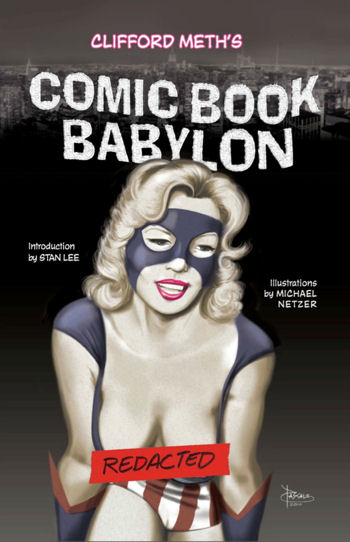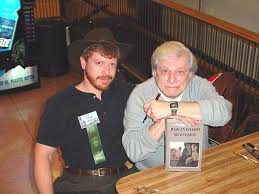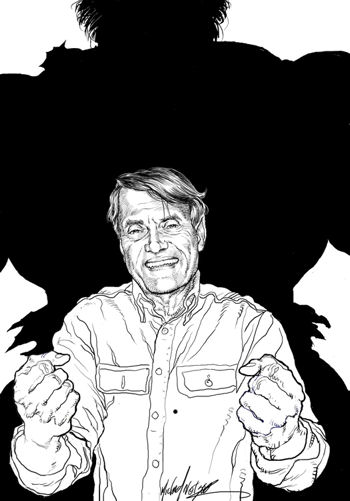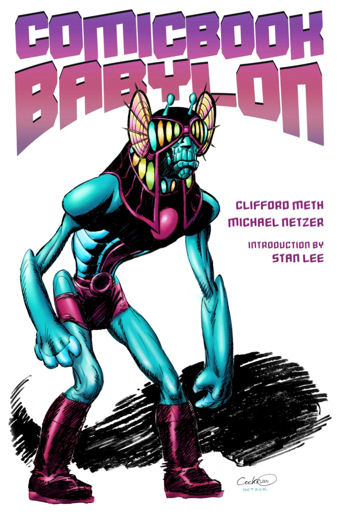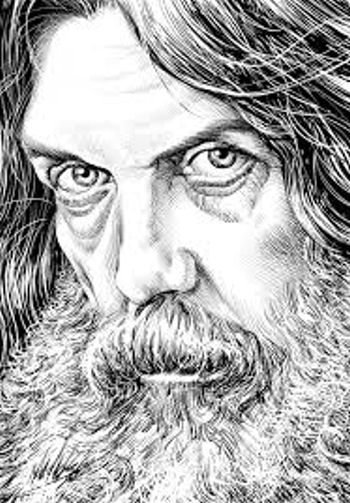|
Observing Comic Book Babylon:
Cliff Meth Speaks For The Old Guard
|
|
|
The truth about comics' dark underbelly...
|
Years ago, Jason Sacks, now editor of Comics Bulletin and one of the nicest guys in comics journalism, sent me an interview
with legendary writer Harlan Ellison about Cliff Meth. At the time, I didn't know Cliff, but thought that if Ellison wanted to talk about him, who was I to turn him away?
Since then, Cliff and I have had many exchanges via email and Facebook, and even once or twice in San Diego face to face. He's a writer of fascinating stories, some venturing into sci fi, some fantasy, and all exploring facets of what it means to be human -- we're a mess, but there's still goodness and hope to be found.
Cliff Meth is also a good guy to have as your friend, with a true unbending sense of ethics, and that's how we first really got acquainted, when he let me know what was happening with Dave Cockrum, the creative force who gave the world Storm, Colossus, and one of my favorite characters, X or not, Nightcrawler. That's just a small piece of what Cockrum had done, and like too many creators before the 80s, Cockrum had been reduced to pretty shaky circumstances. Cliff asked for my help in publicizing the state of affairs, and I am gratified that Fanboy Planet earned a quick reference in Cliff's latest book from Aardwolf Publishing -- Comic Book Babylon (yep, Amazon link there for Kindle edition) .
.
A collection of columns, blogs and reflections on same from an older and wiser Meth, Comic Book Babylon promises to reveal the seedy side of the industry, satisfying our four-color prurience with the same shock and awe that Kenneth Anger's Hollywood Babylon had done decades earlier.
Well, it's not quite that, but Comic Book Babylon is an important book. It's a record of some of the giants of the industry -- too many of whom have passed on while being passed over by comics fans. And yet, on their shoulders stand those who run comics now. It's also stories of a few crazy nights -- sometimes I feel like Cliff has a streak of Hunter S. Thompson in him. His narratives might not always be strictly true, but they reveal truth.
I like him. I never know if you can fairly call someone you've only met for a few minutes a friend, but I am glad that I know him. He's a good guy, and even now with this book, he's still standing up for those creators lucky enough to have called him their friend.
|
|
|
Michael Netzer's portrait of the author...
|
With the release of Comic Book Babylon, Cliff offered me a review copy and a chance to ask him a few questions.
Derek
McCaw: You've been doing comics journalism for quite some time, and have been planning this book since at least 2008. What made 2014 the year for Comic Book Babylon?
Cliff
Meth: I was never more than a sporadic comics journalist. I started with Comics Scene in the 80's and was recruited by Wizard when they launched. I don't remember exactly when I said I'd collect my columns into Comic Book Babylon—was it 2008?
I'd assembled a wealth of interviews with pioneers who went on to become big stars—creators like Frank Miller and Alan Moore who were candid and detailed with me but are largely inaccessible now. There was terrific material that was crying out to be assembled.
And then of course there was the story of how Neal Adams and I had maneuvered Marvel into giving poor, penniless Dave Cockrum his much deserved royalties—a story that had never really been told. I didn't want to wait until someone was doing a benefit for me. It was just time to get this book out.
Derek
McCaw: Obviously a strong theme running through this one is the importance of your friendships. So I thought back to how I ran across you in the first place—pre-Silver Bullet Comics, Jason Sacks sent me an interview with Harlan Ellison about YOU. So let me turn it around—tell me something about Jason Sacks.
Cliff
Meth: I'm fairly certain Jason and I have never met face-to-face but that's the nature of comics' fraternity—we were a cottage industry bounded by fanzines long before there were even message boards and websites.
|
|
|
Cliff Meth and Harlan Ellison.
|
Jason and I were acquainted in the late 70's I believe and then ended up working together for SilverBulletComicBooks. He's a good editor. I like him a lot. Jason is level headed, competent, and likes to help people. At my suggestion, Aardwolf Publishing hired him as a consultant to bring books like Comic Book Babylon to e-readers. I hope others will do the same.
Derek
McCaw: And Ellison—to readers who have not discovered him, and there must be a few, what about him makes him so vital as a writer and as a cultural force?
Cliff
Meth: Comic Book Babylon is dedicated to Harlan, and he appears in many of the stories I I tell. What makes him vital as a writer? What puts the ape in apricot? Courage. There's a lot of great writers, but Harlan was mine, and I think I made that choice because he is terminally courageous, and that inspires confidence.
As a cultural force, it's the same thing—a confluence of his courage and clear thinking. Read "Jefty Is Five." Or watch the video "Pay the Writer" and then realize that it's the same man. His passion and his honesty are almost childlike and yet they are governed by this razor-sharp wit and fearless, heroic character that you can hardly believe is real sometimes.
If Harlan Ellison didn't exist, then we would have had to invent him. Derek
McCaw: Who on the horizon could you see taking up the banners that Ellison has waved?
Cliff
Meth: I'd like to think that I've picked up at least one. But I think to a certain extent many writers channel our inner Ellison. He's made an immeasurable difference on my generation—both writers and the readers he's reached with that shock of recognition he provides. But there isn't a single writer that I can point to from my generation who is as important to my generation as Harlan was to his.
|
|
|
Michael Netzer's portrait of great Hulk and G.I. Joe artist Herb Trimpe...
|
Derek
McCaw: I'm going to save the bulk of my Dave Cockrum questions for a project you have coming up, but you've obviously befriended many of the formative artists of your youth. In a column on Don Perlin, you opine a lack of individual styles in mainstream comics today. The journeymen of yesterday were still so recognizable, but not so much today. Why do you think that happened?
Cliff
Meth: I can only venture a guess. During the so-called Silver Age, Marvel, in particular, had established a house style that was largely based on Jack Kirby's influence. Nevertheless, you could still have a Gene Colan drawing like only Gene Colan could draw, and John Buscema drawing like only John Buscema. Then along came Jim Steranko breaking all the rules and making everyone gasp at his artistry and style which, nevertheless, didn't compromise story.
But what eventually followed was an adherence to formulae that seemed pretty well mandated. Let's take the late 80s where a veteran like Herb Trimpe was being forced at the threat of unemployment to change his look to resemble Rob Liefeld's style. I don't know if comics have fully recovered from that. Kubert School graduates want to draw like Adam and Andy Kubert but many of them end up looking like a poor man's Gil Kane. I'm sort of half-kidding.
There's still plenty of room for individuals. I'm not up on the new breed very much but there's guys like Charles Paul Wilson III showing that you can still break new ground.
Derek
McCaw: Who catches your eye now?
Cliff
Meth: I recently purchased commissions from Charles Paul Wilson III and Jason Metcalf because I like what they're doing.
|
|
|
A beautiful Dave Cockrum cover drawing...
|
Derek
McCaw: I want to thank you for unintentionally reminding me of a time when internet comics journalism was a smaller playing field—you have a reference to Fanboy Planet early on when you first began making people aware of Dave Cockrum's health problems and the way Marvel had treated him. What's your opinion on the state of the internet today in relation to comics news?
Cliff
Meth: Well, the world certainly got smaller, didn't it? Facebook and Twitter make journalists of people who can't even deliver proper sentence structures. But information is easier to obtain now, even if it's faulty. And I think that applies to all things, not just comics. I tend to read Tom Spurgeon if I'm interested in comics' happenings. He's really the gold standard because he can write well.
Derek
McCaw: And whether you intended to or not, you've become one of the well-known names in the fight for creators' rights. Do you think things are better than you found them?
Cliff
Meth: Only for the lawyers, sadly.
Derek
McCaw: Your illustrator—and whoa, some fantastic illos there—is Michael Netzer. Many young readers might not have any idea who he is, yet obviously he's great. I know he's become a somewhat controversial figure in comics thanks to Bleeding Cool, but let me ask two things—a) if somebody sparks to his work reading Comic Book Babylon, where would you
recommend they go for more Netzer? b) Is he interested in mainstream work anymore?
Cliff
Meth: Michael is as unique an artist as any I've ever met. He is not about money. That's easy to do once you've made some. It's easier to be Alan Moore and say "fuck Hollywood" and "fuck comics" after you've made enough to do whatever you want.
|
|
|
"...a man is entitled to grow..."
|
I'm not saying Alan is insincere—a man is entitled to grow. But Michael makes growth choices that are difficult. He's often struggled financially. Regardless, Michael doesn't do whatever he wants to—he does whatever he thinks is correct. He is very Harlan-like in that regard.
So to answer your questions, if someone wants more Netzer, they can certainly find his old comics here and there and they aren't selling for terribly high prices. And they can visit his various websites and see what he's about.
And they can wait another half a year of so—at least that's how long I expect it to take—because Aardwolf Publishing plans to bring out a major project of Michael's. I love his work and his soul and I'm prouder than I can express to have Michael illustrate my own projects from time to time.
Derek
McCaw: You've had an adventure or two in Hollywood (Meth's IDW mini-series Snaked had been optioned) -- what's your opinion on that uneasy relationship to comics? Is Hollywood a necessary evil to deal with when trying to do good comics that people notice?
Cliff
Meth: As a writer, you get past that fairly quickly. Writing a comic or a story so a producer might option it is about as dumb as purchasing a comic book because you think it will be a collector's item some day.
Comics and stories have to be written to entertain the audience they are intended for, else you've insulted your readers' intelligence, and they won't tolerate that for very long.
Cliff tells me that a hardcover edition of Comic Book Babylon is coming. But for now, you can purchase Comic Book Babylon for Kindle on Amazon. for Kindle on Amazon.
|
